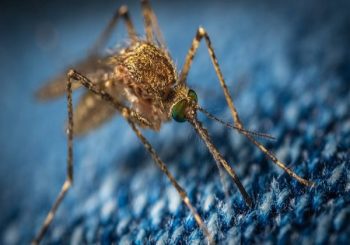 By Alex ‘Earthie Mama’ Du Toit
By Alex ‘Earthie Mama’ Du Toit
Contributing writer for Wake Up World
Please tell me you are not still using Bug Repellant Spray with DEET in it! I know that DEET is very effective at keeping pesky bugs away and it lasts a long time too. BUT, it is a pesticide that is so toxic and harmful to your body, your children’s bodies, your pets and the environment. Mosquitoes and other bugs are a nuisance and their bites can be extremely irritating but using DEET is not worth the risks especially when there are other alternatives that are made from nature and are completely safe.
[pro_ad_display_adzone id=”110028″]
Dangers of DEET
Are you one of those whom mosquitoes love? According to many studies there are reasons for that and protecting yourself from bugs is important because of all the diseases they could carry. The synthetic bug repellants are full of toxic chemicals, including DEET. The Environmental Protection Agency says you should avoid breathing it in, not to spray on your face and wash it off once finished outdoors. If DEET can kill bugs imagine what it is doing to your body and the environment.
Allergic Reactions
When DEET is applied to the skin, some people have adverse reactions like swelling, rashes, redness and hives. There have been many case studies done on those that developed hives, severe itching, and other reactions after exposure to DEET. (1)(2)(3)
Seizures and Brain Malfunction
In some cases the ingestion of DEET and repeated or extensive use can lead to seizures. Most of those cases included children under 16 years of age.
The most prominent symptom among the reported cases was seizures, which affected 72 percent of the patients and was significantly more frequent when DEET products were applied to the skin. Researchers concluded that “repellents containing DEET are not safe when applied to children’s skin and should be avoided in children.” (4)
Carcinogenic Properties
There is some evidence that suggests that DEET contains carcinogenic properties that can cause dangerous effects when inhaled or applied to the skin. In Germany, scientists investigated DEET. When the cells from tissues were biopsied, were exposed to DEET for 60 minutes, the DEET displayed carcinogenic effects in the human nasal cells. (5)
Toxic for Pets
The Animal Poison Control Center reports that when animals are exposed to DEET there can be many issues including vomiting, shaking, tremors, seizures, disorientation, tremors and gastrointestinal issues. If the pet inhales DEET, there can be increased difficulty in breathing. (6)
Toxic for the Environment
The US environmental Protection Agency says DEET is toxic to aquatic environments including fish and plants. When DEET is sprayed it remains in the air until it is broken down It also sticks to soils and can get into our food or effect wildlife and plants. (7)
DEET Alternatives
There are many different varieties of bug sprays. There are chemically made ones that are loaded with toxic ingredients including the pesticide, DEET. There are also plant based bug sprays that are usually made up of essential oils that repel bugs.
I have never used DEET on my children and we lived in Costa Rica where the bugs are huge and the mosquitoes carry Dengue Fever. Instead I formulated a bug spray that works to keep all bugs away.
Here is a recipe to make your own bug spray
OR you can buy my BUG AWAY SPRAY here
I have mastered the formulation and it has been tried and tested all over the most bug ridden places on the Earth. The combination of essential oils in an organic witch hazel base leaves your skin soft and smelling good. It can also be used as an anti itch spray. To learn more click here.
Keep those bugs away the natural way!
~ Alex
Article sources:
- https://www.ncbi.nlm.nih.gov/pmc/articles/PMC4304077/
- https://www.ncbi.nlm.nih.gov/pubmed/23837149
- https://www.ncbi.nlm.nih.gov/pubmed/10416276
- https://www.ncbi.nlm.nih.gov/pubmed/12003267/
- https://www.aspcapro.org/resource/shelter-health-poison-control/dont-deet-dog
- http://npic.orst.edu/factsheets/DEETgen.html#env
- https://www.ncbi.nlm.nih.gov/pubmed/12396679
- https://www.ncbi.nlm.nih.gov/pubmed/10416276
- https://www.ncbi.nlm.nih.gov/pubmed/12396679
Recommended articles by Alex ‘Earthie Mama’ Du Toit:
- 10 Tips to Get a Good Nights Sleep Naturally
- The Link Between Alcohol and Magnesium Deficiency
- Nature’s Most Powerful Antibiotics (Recipe Included!)
- 10 Health Benefits of Cucumbers
- Dirt is NOT Dirty – How Playing in the Dirt Benefits the Immune System
- How to Make Kombucha
- Practical Tips for Raising Earth-Conscious Children
- Ditch the Toxic Pharmaceuticals, Make Your Own Natural Body Care Products
- Turmeric Milk Recipe: a Natural Mood Enhancer and Depression Fighter
- Treating Anxiety Naturally
Originally published at earthiemama.com and reproduced here with permission.
About the author:
 Alexandra is a true Earthie Mama, helping others tune into their most natural, thriving state while bringing harmony and balance into all areas of their lives. She hosts a well-known blog, EarthieMama.com, where she writes about health and wellness, conscious parenting, green living, self sustainability and getting off the grid. Alex also has an MA in Psychology, and is a registered Yoga Instructor, environmentalist, conscious mother, green living advocate and natural birthing expert. She also sells all natural products and her ebooks through her website.
Alexandra is a true Earthie Mama, helping others tune into their most natural, thriving state while bringing harmony and balance into all areas of their lives. She hosts a well-known blog, EarthieMama.com, where she writes about health and wellness, conscious parenting, green living, self sustainability and getting off the grid. Alex also has an MA in Psychology, and is a registered Yoga Instructor, environmentalist, conscious mother, green living advocate and natural birthing expert. She also sells all natural products and her ebooks through her website.
Please check out her website at EarthieMama.com, connect with Earthie Mama on Facebook, or sign up to the free EarthieMama e-newsletter!
[pro_ad_display_adzone id=”110027″]






